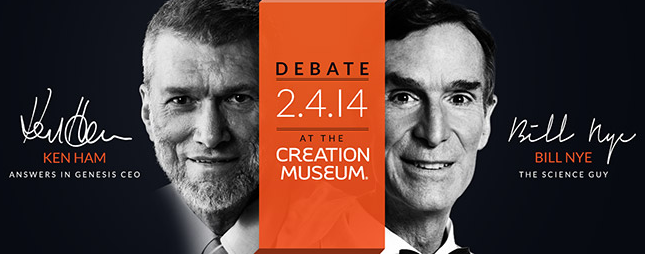Debate Night: Ken Ham Vs. Bill Nye
The debate is proving more popular than I ever anticipated. But this I did not expect:
You read that right. Even if Nye bests Ham in public, Ham bested Nye (who didn’t even make an appearance) on Facebook. Ham even bested Benedict Cumberbatch.1
For his part, Ken Ham shares debate motivations today at CNN, such as:
Even though the two of us are not Ph.D. scientists, Mr. Nye and I clearly love science.
As a former science instructor, I have appreciated the useful television programs that he hosted and produced, especially when he practiced operational science in front of his audience.
He and I both recognize the wonderful benefits that observational, operational science has brought us, from cell phones to space shuttles. But operational science, which builds today’s technology, is not the same as presenting beliefs about the past, which cannot be tested in the laboratory.
 Here Ham does what he doesn’t show nearly enough elsewhere: find a cultural touchpoint (or “common ground”), with an opponent, share it, and then offer an alternative view — or subvert based on the touchpoint itself.
Here Ham does what he doesn’t show nearly enough elsewhere: find a cultural touchpoint (or “common ground”), with an opponent, share it, and then offer an alternative view — or subvert based on the touchpoint itself.
In Acts 17, the Apostle Paul did this in public debate. More Christians should do this also: the agree/subvert approach.
Wouldn’t it be great if Ken Ham forsook a “you evolutionist kids get off my (adopted) country’s lawn” approach? What if he — and other Christians — instead showed more of his geeky side and came out swashbuckling, not screaming?
This seems the best direction: avoid the dull debates over carbon dating, et. al. Instead: agree/subvert on bigger issues.
If Ham sticks with this material, could not all Christians tentatively agree?
- Spirited yet civil discussion in public, about controversial matters, is always a good thing.
- Science has limitations. And no one need be intimidated into silence by any discipline called “science.”
- The whole point of science is to question things — even things that “science” has already “settled.”
- “Science” actually says nothing, only scientists. And all scientists have biases on different topics.
- Creationists are biased toward creation, evolutionists toward evolution, and so on. Because: human nature.
- Naturalistic bias — e.g., “we’ll not talk about or allow for the idea of God in this area“ — is at best vulnerable to challenge, at worst an endorsement of personal hypocrisy. (If God has no place in a science textbook, why regard Him anywhere else?)
- Why not discuss a potential place for existing creation histor(ies), even legends, in origins discussions? Is this immoral?
That last brings me to two final words of advice, not for the debaters (they don’t need it) but for various sets of fans or anti-fans.
- Christians, please do stop being embarassed by Ken Ham. Even if he’s a quack, he no more casts aspersions on the state or reputation of your faith than a crazy “Coast to Coast AM” caller with alien-abduction claims casts aspersions on evolution. Moreover, incessant and unqualified complaining about how other Christians “come across” to non-Christians is both Biblically questionable and can look pathetic.
- Atheists/agnostics/whatsits, please do stop your whining and hollering just because Bill Nye “deigned” to debate a creation advocate. Why not have a discussion like this? In my view it was very kind of Nye to engage in this topic (into which he already inserted himself). Coudl this not prove that classical humanists do have ethics and can be gracious? Those who insist that all those Christians who have it all wrong — that atheists are just as moral than Christians2 — have a prime opportunity to demonstrate their morality and philosophy in a more gracious, polished venue than yet another YouTube comments thread.































That picture of Robin Hood is scary! Looks like a girl with a beard.
I like your 7 points
This is better than the Super Bowl.
Ummm…. Ken Ham is falling back on using theistic philosophical evidence. Seems like a cop-out, given the specific subject of the debate.
I think it’s sad that when Nye expressed his wonder at the thought that the thing that pushes the stars apart — the thing that was before the Big Bang — might be with us here, Ham could only tell him that there’s a book.
I’m disappointed that Ham won’t answer the question of whether he would still be a Christian if Young Earth theory could hypothetically be disproved. The answer should be YES, absolutely. Because observable science shows that we are all sinners, that our situation is utterly hopeless. We would still need a savior even if the universe were billions of years old, even if man had evolved from primordial slime, even if the Bible were not literally true in its entirety. There is only one Savior, and He lived and died and lived again in real history, not just in the Bible.
Nye’s joy and wonder are compelling, but I despair because I know that his unfounded faith in progress — his assumption that knowledge and technology are inherently worthwhile — is groundless. In contrast, Ham’s joy is shallow, too easily satisfied. Ham evokes only simplistic religious joy. I understand being stunned to silence at the majesty of God, but simply saying that God wrote the book is not enough to rejoice. There is real wonder in knowing that God created, but it’s not enough. There are too many mysteries that the Bible does not explain.
In the early ’90s Ken Ham was far more captivating because of his “swashbuckling” attitude. Say what you will about his content — and as many readers may know, I still find “literal” six-day creation quite defensible — it was the style and enthusiasm that also helped sell it. From what I saw of the debate, little of that could be seen here. Yes, Christianity is more than joy and enthusiasm, but it must never be less. I also find it a shame if indeed Nye came across more enthusiastic about his faith in science in the world itself than Ham seemed to come across about the world’s and science’s Creator.
In other words: you make me want to avoid the debate entirely, bainespal. 🙂
I don’t think Ham came across as arrogant or short-sighted or anything. He seemed humble. At some points, he even gave the impression of being slightly chagrined. I could tell that he was suffering, which is a legitimate way for a Christian to debate. Ham’s presentation made it hard to hate him, at least.
Nye was also not overly antagonistic, even though he was rigorous in attempting to dismantle Young Earth theory. Many viewers would probably conclude that Nye succeeded. He had an easier job, granted that public opinion was already on his side (though maybe mitigated slightly by the fact that the venue was the Creation Museum). Nye was as enthusiastic about science as I remember him being on the show when I was kid.
Like
Yes